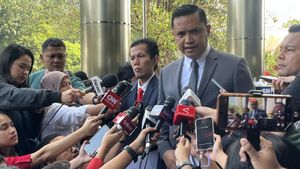JAKARTA - DKI Jakarta Governor Anies Baswedan has drawn criticism after issuing an incentive policy that eliminates the payment of rural and urban land and building tax (PBB-P2) with a tax object selling value (NJOP) below Rp2 billion.
Deputy Governor of DKI Jakarta Ahmad Riza Patria defended. Riza emphasized that the DKI Provincial Government does not have a profit orientation in making policies.
Although, the release of PBB on houses with NJOP below Rp. 2 billion will reduce the income in the DKI APBD.
"There is a reduction in income, but it is not commensurate with the benefits we provide. The provincial government is an organization that does not seek profit, but protects the community," said Riza at DKI Jakarta City Hall, Tuesday, June 14.
Regarding the potential for reduced regional income, Riza views that there are other sources that can be obtained. However, he did not explain the alternative method that the DKI Provincial Government would take to cover the revenue shortfall.
"There are many other sources of income. If the people are calm and comfortable, that is also another source of income," he said.
For information, Member of the DKI Jakarta DPRD, Hasbiallah Ilyas, said that Anies' policy of liberating PBB with an NJOP of less than Rp. 2 billion was inappropriate.
Because, he said, homeowners who are taxpayers with a nominal NJOP are among the middle class. They, said Hasbi, do not need incentives.
"We agree to relieve the residents, but it's for the lower class. If it's for the middle class, it can't be done," said Hasbi when contacted, Tuesday, June 14.
Hasbi emphasized that PBB is one of the major sources of APBD revenue. This year, the DKI Provincial Government targets PBB revenues of up to Rp. 10.25 trillion.
Therefore, with the release of PBB on NJOP with a value below Rp. 2 billion, Hasbi is worried that regional revenues will decrease.
"If we look at the current income, it's actually not worthy to be issued (the NJOP PBB exemption) is issued at IDR 2 billion," said Hasbi.
"We are worried that DKI's income will decrease drastically. Because our economy is just growing, right. At the very least, the provincial government must find another source of income for the local government," he continued.
The English, Chinese, Japanese, Arabic, and French versions are automatically generated by the AI. So there may still be inaccuracies in translating, please always see Indonesian as our main language. (system supported by DigitalSiber.id)













